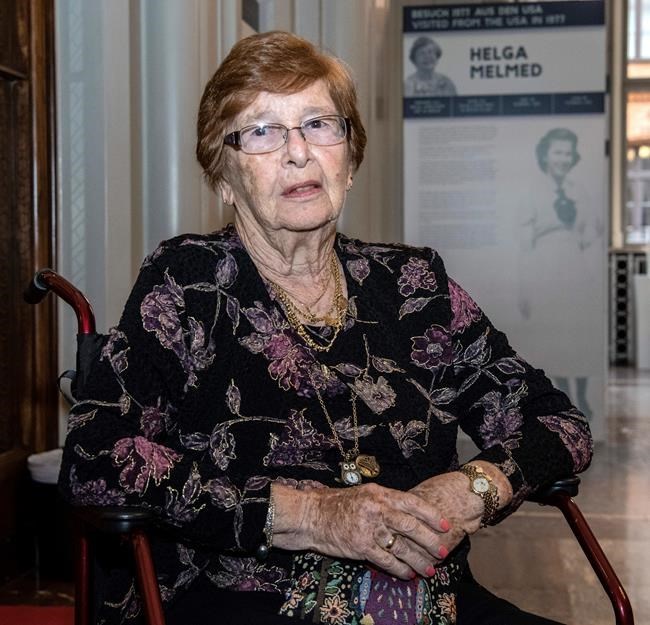
In this Wednesday Sept. 11, 2019 photo, Holocaust survivor Helga Melmed poses for a portrait during an event celebrating the 50th anniversary of a program for people expelled and persecuted by the Nazis and bringing tens of thousands of them back to their home city for one-week trips in Berlin. Helga Melmed was 14 years old when the Nazis forced her family on a train and deported her from her hometown of Berlin to the Jewish ghetto in Lodz in 1941 and she finally freed by British soldiers in 1945 from Bergen-Belsen. (Paul Zinken/dpa via AP)
September 15, 2019 - 12:35 AM
Berlin was the last place Helga Melmed had expected to see again.
She was 14 when the Nazis forced her and her family onto a train from their home in the German capital to the Jewish ghetto in Lodz, Poland, in 1941.
That started a gruesome odyssey that later saw her imprisoned at Auschwitz and Neuengamme outside Hamburg before she was finally freed by British soldiers in 1945 from Bergen-Belsen in northern Germany, a 46-pound walking skeleton.
For years, she never considered returning to Germany until she was invited on a trip by the city of her birth, in a reconciliation program meant to help mend ties with former Berliners who had been forced out by the Nazis.
Now celebrating its 50th anniversary, the program has successfully brought people like Melmed on one-week trips to Berlin to reacquaint themselves with the city. Some 35,000 people have accepted the invitation since it was first issued in 1969, and while the numbers are dwindling a few new participants still come every year.
"I thought I'd never come back," Melmed, 91, who emigrated to the U.S. via Sweden after the war, told The Associated Press in an interview.
The "invitation program for former refugees" has brought back primarily Jewish emigrants who fled the Nazis, or those like Melmed who survived their machinery of genocide.
On Wednesday, she and other former program participants were invited to Berlin City Hall to celebrate the half-century anniversary.
At a ceremony mayor Michael Mueller thanked them for coming back — despite all they suffered at the hands of the Germans.
"Many people followed our invitation, people who had lost everything they loved," he said. "I want to express my strong gratitude to you for putting your trust in us."
Despite skepticism at the time that anyone persecuted by the Nazis would want to return, in 1970 — one year after the program's launch — there was already a waiting list of 10,000 former Berliners who wanted to come back for a visit.
More than 100 other German cities and towns have instituted similar programs but no municipality has brought back as many former residents as the capital.
Berlin, of course, also had the biggest Jewish community before the Holocaust. In 1933, the year the Nazis came to power, around 160,500 Jews lived in Berlin. By the end of World War II in 1945 their numbers had diminished to about 7,000 — through emigration and extermination.
All in all, some six million European Jews were murdered in the Holocaust.
Melmed's father was shot dead in the Lodz ghetto — where the Nazis concentrated Jews and forced them to work in factories — a few months after their arrival and her mother died of exhaustion a few months later, shortly after Melmed's 15th birthday.
Melmed, who lives in Venice, Florida, received her invitation under the reconciliation program 42 years ago.
"One day, out of the blue, I found a letter in the mailbox inviting me to come back for a visit," the retired nurse said at the hotel where she was staying with two of her four children and a grandson.
"So, in 1977, my husband and I travelled to Berlin."
They were part of an organized group tour of dozens of other former Berliners who had been persecuted by the Nazis.
"I don't know if the trip was a dream or a nightmare," Melmed said. One afternoon, she went for a coffee at Berlin's famous Kempinski Hotel — today called the Bristol Hotel — just like she used to do as a little girl with her mother and dad, a banking executive.
"It was heart-breaking," Melmed said.
Her life story is chronicled in the exhibition "Charter Flight into the Past" about the program, which opened Thursday at Berlin's City Hall and will run through Oct. 9.
Johannes Tuchel, the director of the German Resistance Memorial Center, which curated the exhibition, said that many returnees had conflicting emotions.
They didn't trust the Germans — especially in the early years of the program, when many people they saw in the streets still belonged to the Nazi generation. Often, memories of loss and pain were stirred up by the visit, but at the same time many were also able to reconnect with a city that harboured many happy childhood mementos for them.
For Melmed, closure came only at an old age. In 2018, when she turned 90, she decided to return once again to Berlin. It was then that she met the current tenants of her old family home in the Wilmersdorf neighbourhood of Berlin. They invited her back into the apartment and organized a plaque-laying ceremony last week to commemorate her parents on this year's visit.
Last week, city officials presented her with her original birth certificate and her parents' marriage certificate.
"Now it's all closure for me," Melmed said with a peaceful smile as she touched her golden necklace with a Star of David pendant. "It doesn't hurt anymore."
News from © The Associated Press, 2019